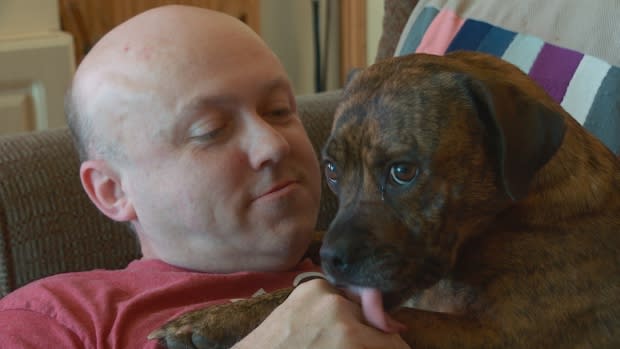Apartment hunter says his dog should be considered a service animal
Steve Wotton says he has two seemingly impossible tasks on his hands: Finding an affordable place to live, and proving to P.E.I. landlords that his dog Nova provides him with an essential service he needs.
Wotton has epilepsy, and said Nova has learned instinctively to alert anyone nearby when he starts to have a seizure, by barking and whining loudly.
He said in their five years together, Nova has alerted neighbours who rushed to help on a couple of occasions.
"She makes me feel safer," said Wotton. "If I ever take a seizure, I feel more assured before I go into the seizure that nothing's going to happen."
Landlords want license
It's why Wotton thought, when he started his search for an apartment six months ago, the endless listings that say "no pets allowed" would still be an option.
He considers Nova to be his service dog, and assumed landlords couldn't deny him accommodations as a result.
He said he has a doctor's note at the ready, explaining that he's epileptic and why it's important that Nova live with him.
"So I tell [landlords] I'm epileptic and that she's my [service dog]. But they say the only way they'll allow Nova is if I can show them a [service dog] licence," said Wotton.

He says he called the P.E.I. Council of People with Disabilities looking for help, and it advised that he contact the Lions Foundation of Canada, which provides service dogs to people with disabilities free of charge.
"They spend a lot of time training their dogs. … The certification they receive is documented and very clear," said Marcia Carroll, the council's executive director.
'She's already proven herself'
But Wotton maintains he shouldn't need to replace Nova, just to find a place to live.
"[Nova] depends on me like I depend on her," he said. "Why should I have to go get rid of my dog I've already had for five years? … She's already proven herself."
If [the animal] is trained to do something in relation to the disability, that's what we look for to define it as a service animal — Brenda Picard, executive director, P.E.I. Human Rights Commission
Wotton said he's started filling out the paperwork to submit a complaint to the P.E.I. Human Rights Commission.
Brenda Picard, the commission's executive director, won't comment on specific cases.
But she maintains landlords shouldn't be asking for proof that a dog is a service animal.
"That's a bit of a fallacy," said Picard. "You don't need to prove that you need to be in a wheelchair. If the person says they have the disability, and they have a service animal and they explain what [the service animal] has been trained to do ... then the landlord or service provider should assume that's right."

Whether that means Wotton's rights have been violated isn't yet clear.
Picard said given there's no legislation on P.E.I. laying out what qualifies as a service animal — as there is in some other provinces — the commission has to assess it on a case-by-case basis.
"If [the animal] is trained to do something in relation to the disability, that's what we look for to define it as a service animal," she said.
"Certainly if it's a self-trained animal it's probably going to be a little bit more challenging for the person to be able to establish the threshold, but that doesn't mean that they can't. Unfortunately, we can't certify someone in advance. We can only assess that if there's been a complaint about discrimination."

"A doctor's letter should be enough," Wotton said. "These landlords don't think that while we go through all this process, we still don't have a roof over our heads."
Wotton also feels there should be a process on P.E.I. to get his dog certified.
CBC did reach out to the P.E.I. government for a response to Wotton's concerns, but hasn't heard back.
More P.E.I. news


